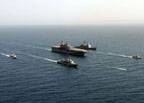ESGs: Delivering Presence and Security
By Mass Communication Specialist 3rd Class Coleman Thompson, Commander, Naval Forces Central Command/Commander, 5th Fleet Public Affairs
The maritime environment throughout the world is constantly changing and evolving. With advances in technology, and changes in the geo-political environment, it is important for naval forces to project forward presence and foster regional cooperation.
One tool used by the U.S. Navy to project its presence are Expeditionary Strike Groups (ESG). These ESGs, such as the Nassau Expeditionary Strike Group currently operating in the U.S. 5th Fleet, are deployed worldwide and can project sea power ashore by landing amphibious forces via helicopter, amphibious track vehicles, air cushion landing craft and assault craft where ever the need arises. Their capabilities center on flexibility and readiness to conduct expeditionary operations ashore and afloat.
While in 5th Fleet amphibious ships and squadrons operate as part of ESG 3, which serves as a command element that plans and executes a wide array of missions.
"My job is to deepen the capabilities of the unit, as well as lead the staff in training and integration of forces," said Rear Adm. Kendall Card, commander, ESG 3. "We are ready to operate either at sea or ashore and can assume duties as a warfare commander at a moment's notice"
Vice Adm. Kevin Cosgriff, commander U.S. Naval Central Command, said that ESGs are vital to executing missions in 5th Fleet.
"The principle role of an ESG is to be a command element, to be an extension of my headquarters at sea or ashore," he said. "They work things at the tactical level that require the skills of an ESG, including ships, Marine Expeditionary Unit, (MEU) and other combatants. It's the tactical application of the decisions we make in the headquarters that are accomplished out here."
The units of an ESG can operate either together or disaggregated and execute a wide variety of missions including humanitarian assistance, non-combatant evacuation operations, over-the-horizon strike, visit, board, search and seizure operations and amphibious raids. In 5th Fleet, the diverse make-up and broad deployability of an ESG have made it a critical combat force in the effort to deliver security in theater.
"Elements of an ESG have been actively involved in anti-smuggling operations," said Cosgriff. "We've had an ESG command a multilateral effort to actively counter piracy which we believe led to the release of six pirated vessels last fall once we became more actively involved. It also gave us a chance to team with the legitimate government of ."
The makeup of an ESG fluctuates as the mission changes. But they typically consist of one or two amphibious ships capable of launching landing craft from their well decks, as well as surface ships including cruisers or destroyers that provide anti-air, anti-surface ship and anti-submarine capabilities. ESGs are also augmented by a MEU, which includes a ground and air combat element, that provide aerial support for the strike group.
These robust capabilities give the commander a wide variety of options and enables sustained independent operations in more dynamic or asymmetric environments.
Another important mission of the ESG is to provide humanitarian assistance in a time of crisis. ESGs are always ready to provide support when natural disasters occur, such as in in 2004 and in in 2007.
According to Cosgriff, ESGs not only provide security, but they also serve a diplomatic role.
"The idea for U.S. Naval forces in Central Command is to be a force that helps provide security in order to let the local citizens harvest the benefits of prosperity for themselves," he said. "We have an opportunity to continue to deepen our relations out here with the friendly countries. We want them to know that we are a nation that commits for the long run - we've been here for several decades and we intend to be here for decades to come. We want to contribute to the well-being of the citizens in this region."
Nassau ESG is deployed to the region in support of Maritime Security Operations (MSO). MSO help develop security in the maritime environment, which promotes stability and global prosperity. These operations complement the counterterrorism and security efforts of regional nations and seek to disrupt violent extremists' use of the maritime environment as a venue for attack or to transport personnel, weapons or other material.













